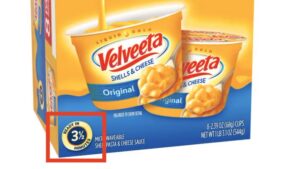Court Tosses Lawsuit Claiming Mac & Cheese Took Too Long to Make

Kraft shouldn't pay [the plaintiff's lawyer] a dime on this one," I recommended a while back. See Lawsuit Claims Mac & Cheese May Take Seconds Longer to Make Than Promised" (Nov. 21, 2022). 100% free advice, and 100% correct.
Recall, please, that plaintiff Amanda Ramirez allowed her name to be put on a complaint alleging that she was misled by the phrase READY IN 3 1/2 MINUTES" because she didn't understand that was just the cooking time. Eventually she realized that because a few seconds would be required to open the package and stir the contents, the product could not possibly be ready" in 3.5 minutes as Kraft had so deviously claimed. Impeccable logic like this leaves a defendant no choice but to sign a hefty settlement check, or at least that's what Ramirez's lawyers seem to think.
I predicted the case would be thrown out on reasonable consumer' grounds," like the (in)famous Crunch Berries case. It could have been, but instead the court held Ramirez hadn't alleged an injury and so couldn't sue in federal court. (Can someone who hasn't been injured sue in state court? Sometimes! Are the results stupid? Frequently.) More specifically, Ramirez had alleged that she kept buying the product even after learning the awful truth: that it would take at least 211 seconds to get it ready." But if she then kept buying the stuff, that suggested she didn't really care about the 210-second promise, so even if Kraft lied about that, the lie didn't harm her. She didn't pay anything extra because of it.
This is the right result-but for the wrong reason.
The court would be right if Ramirez had alleged that she tried to make the mac & cheese at least once, thus learning how long it took to make, and then bought it again anyway. But she didn't. What's that? The plaintiff didn't allege that she tried even once to make the mac & cheese she sued about? Nope. She only alleged that she bought it between October and November 2022, among other times." So it's theoretically possible she bought multiple boxes during that time, possibly stocking up in the event of a natural disaster or a zombie apocalypse or a Trump victory, learning only afterward that a fraud had been perpetrated. In that scenario, she would have been trying to get a refund for a stockpile of mac & cheese that had become utterly useless to her because it could not be ready in 210 seconds.
But ... if Ramirez never actually tried to make the mac & cheese (or, I guess, never read the back of the box), how did she learn there was a problem that she needed to sue about? I assume not from the lawyer, because that would mean they just ginned up this claim in order to have a lawsuit. But I guess we'll never know.
So, while I think the plaintiff will take the hint and go away, I think technically the decision is wrong. This is why it would've been better to apply the reasonable consumer" standard: No reasonable consumer would have been as dumb as you claim you were, and therefore case dismissed.
This standard won't apply often, but this is a great case for it. Again, Ramirez was asking the court to believe that she had been willing to pay for this food only if it could be ready in 210 seconds or less, with 211 seconds being a deal-breaker. Nor was she willing to microwave it for, let's say, 204 seconds, leaving six seconds to open and stir. The beauty of the reasonable-consumer standard is that it allows the judge to order that a big pile of dirt be trucked in and hosed down and the plaintiff then thrown into it face-first. Or to dismiss the case with prejudice, at least. Because-and contrary to what Ramirez argued-a federal judge is not required to accept everything a plaintiff says at the pleading stage (in a complaint). Most things, yes. But a federal claim has to be at least plausible," and this one wasn't.
Neither was this one, or this one, and the plaintiffs in those cases have something in common with Ramirez: they have the same attorney. Who is now known for filing unreasonable consumer cases, as another federal court noted in May. That judge not only dismissed the case, he ordered the attorney to produce data about all similar cases he has filed since 2020, including whether each case was dismissed. Plaintiff's counsel has become a wrecking ball when it comes to imposing attorney's fees on other people," the court wrote, [a]nd this Court is starting to wonder who should pay for the cleanup." (On July 13, a federal judge in New York issued a similar order.)
This is not to say that any case filed by this attorney is necessarily bogus. (Disclaimer: I have represented defendants in a few of those cases.) Some have survived motions to dismiss, and I'm sure some have ultimately been successful. It's just that among the many cases he files are a significant number of dumb ones like this. (The two others I've written about, Heart of the Himalayas" and Hint of Lime," have both since been voluntarily dismissed.) Maybe not quite Crunch Berries level, but pretty close, and that's not a good neighborhood to be in.
Speaking of Crunch Berries and false advertising, I should mention that Quaker Oats has at last admitted that, based on the number of stripes on his sleeve, Cap'n" Crunch did not in fact hold the rank of captain, but was a mere commander. That has now been corrected. (Crunch has also grown another finger.) Whether Quaker Oats gave him a long-overdue promotion or just fixed his sleeves remains to be seen, but either way don't be surprised if somebody sues over this decades-long misrepresentation.







 Related Stories
Related Stories